We leave behind the roaring lion and embrace the humble virgin. As a mutable earth sign, Virgo strives to bring order and perfection to the world through the alchemical synthesis of paradox. She carries fire and grain and embodies the secrets of life, the cycles of nature and the force that makes things grow.
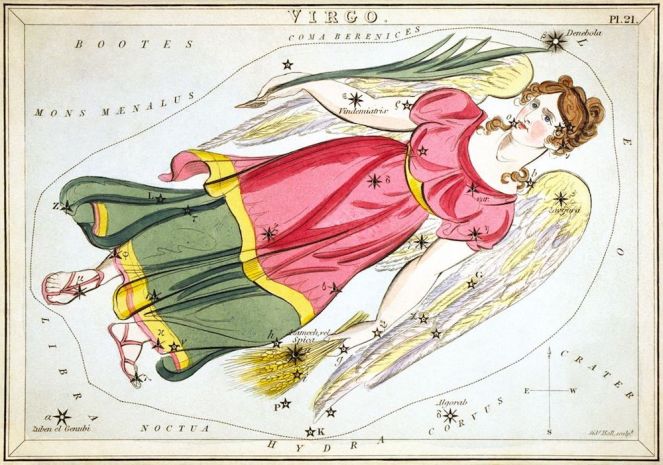
Virgo is a feminine sign and is ruled by Mercury, although some say it should be ruled by the healer Chiron, while others go for Ceres, the Roman goddess of the harvest. Despite these modern suggestions, Mercury is exalted in Virgo and adds another layer of symbolism to the healing motif of the sign. Virgo is balanced and complemented by the opposite sign of Pisces, ruled by Jupiter and Neptune.
The Virgo glyph looks like an M with a loop that represents a serpent’s head burrowing into the earth. This is the coiled Kundalini serpent symbolising the sign’s containment and potential mastery of shakti, the inner fire, or consciousness grounded in the body. (Compare this to Scorpio’s glyph where the serpent’s head rises upwards.) The loop also forms the shape of the vesica piscis, a symbol of the union of opposites connected with sacred geometry and the Divine Feminine in the form of the yoni.
The constellation of Virgo is said to be Astraea, the Greek goddess of justice. Her name means ‘star maiden’ and she was the daughter of the Titans Astraeus (god of dusk) and Eos (goddess of dawn). According to Greek mythology, Astraea was the last immortal to abandon Earth at the end of the Silver Age. She was so disgusted by the wickedness of humans that she buggered off to the heavens and became Virgo.
Astraea represents natural law, not the human concept of justice as found in Libra. She upholds the balance of the seasons and living in accordance with nature. So it’s no surprise she’s not a fan of humans who have an annoying tendency to ignore or transgress the natural order when it suits them, despite the consequences.
This explains Virgo’s need for order but there’s a lot more to the sign than getting your knickers in a twist because somebody has put the spoons in the wrong place in the cutlery drawer…
Virgo Myths
Virgo is associated with Virgin Goddesses, often called the Great Goddess or the Great Harlot. We’ve already met some in Cancer Myths, but here we’ll focus on the fertility and grain goddesses who create life. These goddesses can be virgins and mothers because their divine power comes directly from within themselves, not from a consort or god.
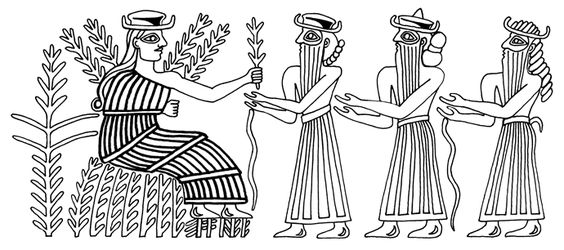
Grain goddesses of the harvest are often shown sitting on heaps of grain, like mini sacred mounds, or they hold sprouting grains in their hands. They’re also associated with healing and teaching mankind the arts of civilisation – things like literacy, mathematics, measurement, astronomy and calendars, as well as the making of beer and bread.
Virgo is the sign of applied mathematics and practical science because these skills are essential for astronomical observations and for organising society. An accurate calendar helps you to calculate when to cultivate seeds and when to harvest, and knowledge of plants and animal husbandry helps society to thrive.
Grain goddesses are also associated with the mythology of the dying and resurrecting god, although this role may have originally belonged to the goddess herself. Fertility is linked to the idea of death and rebirth because when a seed is planted it dies, releasing its energy so the plant can grow (see Aries Myths). At harvest the plants are threshed and transformed in another alchemical act of death and resurrection.
Virgo goddesses include Isis, Seshat, Artemis, and Demeter, but we start in Mesopotamia…
Virgo Myths – Sumer
In Babylonian astrology, Virgo was called ‘The Furrow’ and represented by the grain goddess Shala holding an ear of barley. In Babylonian Star-Lore, Gavin White says Virgo should be seen as a combination of ‘The Furrow’ and ‘The Frond’, which is the goddess Erua holding a date palm, because bread and dates were the staple diet of the Babylonians.
However, these associations relate to a time when Virgo was rising after the summer when the seeds were planted rather than harvested. In earlier times, it would have risen during the heat of summer and so would have been associated with ideas of death and renewal. This was when Dummuzi, the consort of Inanna, descended into the underworld to be reborn bringing fertility to the land (see Aries Myths).
Inanna (and later Ishtar) is a fertility goddess who was known as the Great Harlot – remembered as the Whore of Babylon in the Bible of Christianity. She was worshipped in rites of sacred prostitution where her priestesses would have ritual sex with the king in order to maintain the fertility of the land. Unlike today, these rites weren’t seen as degrading or shameful.
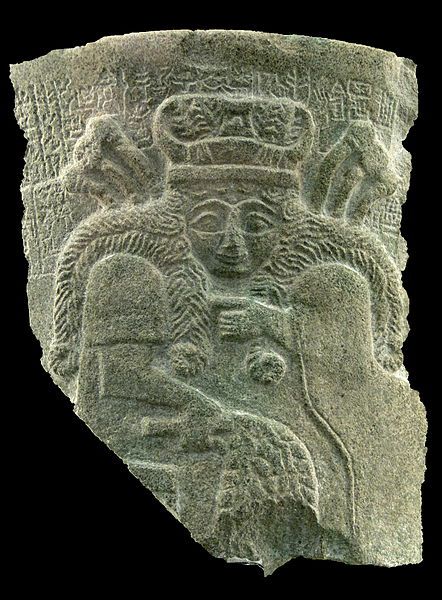
Nisaba is another Sumerian grain goddess of writing, wisdom and the harvest. She was depicted with barley growing out of her shoulders, and was the Scribe of the Gods and record keeper and a teacher who brought the gifts of civilisation to humanity. Meanwhile, the Sumerian healing goddess, Ninisina, was called the Doctor of the Land, and the Great Healer. She stood at the boundary between life and death and presided over births as midwife. Later she became identified with the Babylonian/Akkadian goddess, Gula.
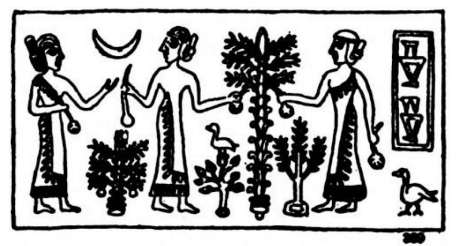
Gula-Bau was a goddess of the underworld who lived in a garden at the centre of the world. She was a grain goddess and was known as the Great Physician who could heal and bring the dead back to life. Her epithets include: Lady of birth; Preserver of Life; Counsellor of Kings; She Who is able to restore life; She Who waters the tree that forms the axis of the world and offers its fruit to Her worshippers; and more!
The garden at the centre of the world should be familiar as the Garden of Eden. There’s a cylinder seal dated c. 2,500 BCE that shows two figures sitting either side of the Tree of Life and a serpent rising behind one of them. This could be Gula-Bau and a consort, offering up the fruit of knowledge:
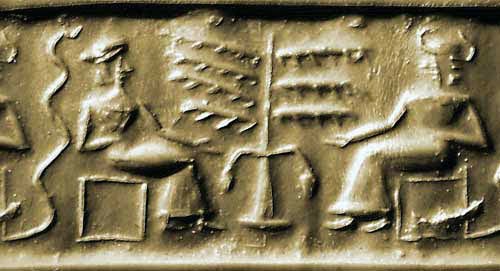
Virgo Myths – Egypt
In Egypt, Virgo was symbolised by two figures: Isis holding a sistrum with Set standing behind her. Isis was known as Aset to the ancient Egyptians and was the goddess of fertility, magic and motherhood. Set was responsible for killing Osiris, the husband of Isis, and the sistrum was a magical musical instrument that was shaken to ward him off.
After Set killed Osiris, Isis searched for his dismembered body in order to bring him back from the dead so she could conceive Horus. This myth links Virgo to the death and resurrection of Osiris which was associated with bringing fertility to the land. As the god of the underworld, Osiris is often shown with grain sprouting from his dead body. In the Coffin Texts, he explains how this works (note: ‘Neper’ means grain, and ‘Geb’ means the earth):
“I am Osiris…I live and grow as Neper, whom the august gods bring forth that I may cover Geb, whether I be alive or dead. I am barley, I am not destroyed.”
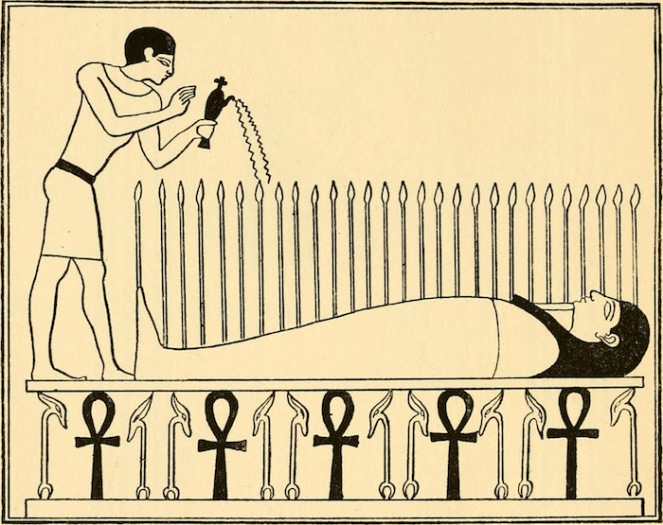
Osiris can’t achieve this alchemical act without the intervention of Isis, and some of her many epithets include Lady of Bread and Beer, Lady of Green Crops, and Goddess of the Fertility of the Field.
The alchemy of life coming from death is mirrored in the making of beer and bread. The seeds can’t be digested unless they’re cooked or fermented, so the grain must be killed and transformed into something edible. To the ancient Egyptians, bread and beer were more than just food, they were also seen as spiritual nourishment for the dead in the underworld. The bread and beer of Osiris would later become the bread and wine of the Christian Eucharist.
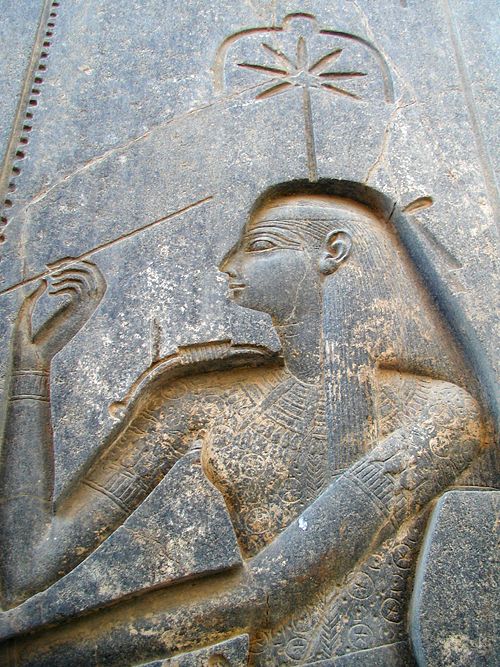
Meanwhile, Seshat was the goddess of wisdom, knowledge and writing. She was called Mistress of the House of Books and looked after the library, and was involved in the ‘stretching of the cord’ ceremonies that laid the foundations for temples. Seshat was the Scribe of the Gods and recorded the Pharaoh’s name on the Tree of Life, as well as the number of his mortal years and all his deeds. Later she was linked with Thoth (the Egyptian equivalent to Hermes/Mercury) and demoted to being his wife and/or daughter.
(You can meet Isis and Seshat in my novel The Shining Ones…!)
Virgo Myths – Greece
In ancient Greece, Artemis was a virgin moon goddess of the hunt. She was chaste and fiercely independent and merciless towards any man who offended her. Artemis is usually depicted with her trademark bow and arrow, often accompanied by deer and hunting dogs, and she reveals Virgo’s love of nature and the wilderness.
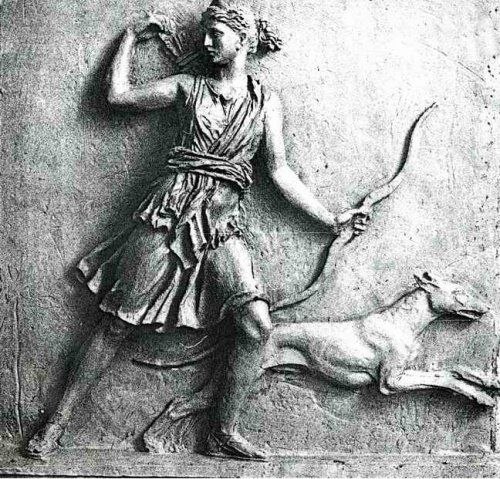
Artemis can be linked back to earlier goddesses under the name Mistress of Animals (see Leo Myths), and to Celtic goddesses of various names, such as Elen of the Ways, often depicted with antlers. Elen is associated with the migratory routes of reindeer and acts as guardian of the ancient track ways known as ley lines – a possible link to Mercury.
Meanwhile, Demeter was the goddess of the harvest, sacred laws, and the cycle of life and death. Her name means Mother God, where de is God, and meter or mater is Mother, and she was known as She of the Grain, and Law Bringer. Her daughter was Persephone, and together they were known as ‘the Two Goddesses.’ (see Gemini Myths)
Demeter presided over the Eleusinian Mysteries that date back to the pre-Olympian gods, i.e. before the patriarchy demoted the goddess. Initiates of the mysteries would undergo a ritual descent and return that re-enacted the myth of Persephone’s abduction into the underworld by Hades. It’s possible that the original myth had Persephone descend to the underworld of her own free will, like Inanna in Sumer, but it was changed to incorporate the new male gods.
The story goes that after Persephone disappeared, Demeter searched for her and refused to allow anything to grow until she found her. The land died so the other gods staged an intervention to help Demeter get her daughter back. Persephone was allowed to return from the underworld only if she hadn’t eaten anything while she was there. But because she had eaten some pomegranate seeds, she had to stay with Hades for part of each year.
The myth symbolises the turning of the seasons, and the Eleusinian Mysteries are said to reveal the secrets of immortality through this cyclical renewal. Demeter is often depicted holding grain in one hand and a torch in the other as she searches in the dark for Persephone. But she’s also often shown with serpents – a symbol of wisdom and rebirth.
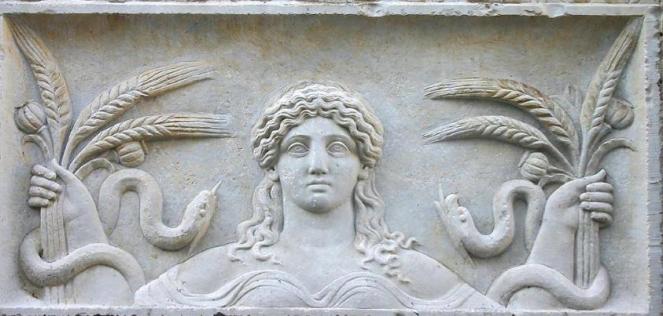
In the Mysteries, Demeter and Persephone were called ‘the older’ and ‘the younger’ implying they were originally one goddess or that they represent two parts of one process. Mother and maiden are bound together and their fates are intertwined. Demeter stood for the harvest and Persephone symbolised spring. But both goddesses also symbolised death: Demeter after she laid waste to the land in her grief, and Persephone after she was taken into the realm of the dead.
However, despite Persephone becoming Queen of the Underworld, the dead were known as Demetreioi, which means ‘Belonging to Demeter’ – another link to the mystery that life begins in the darkness of the soil where the seed is planted. Life perpetuates itself through the cycles of death and rebirth, and each moment births the next in an unending cycle of interconnection and interdependence.
The Meaning of Virgo
Virgo is a contradictory and paradoxical sign and it can be hard to embody opposites like virgin and harlot, or fertile and barren, or mother and maiden. But understanding the meaning of the word ‘virgin’ can help to clear up the confusion. It was originally applied to unmarried women, including mothers.
The paradox is expressed in the Gnostic text The Thunder, Perfect Mind where the goddess Sophia explains who She is:
“…For I am the first and the last.
I am the honoured one and the scored one.
I am the whore and the holy one.
I am the wife and the virgin.
I am the mother and the daughter.
I am the members of my mother.
I am the barren one and many are her sons.
I am she whose wedding is great,
and I have not taken a husband. …”
So being a virgin has nothing to do with chastity or remaining sexually intact. The idea of the chaste virgin, sealed off from the world, has more to do with the fear of women and sex that comes from our Christian inheritance in Western culture. Virginity according to this worldview is seen as a way to keep yourself apart and separate – an avoidance or rejection of life and the body and its desires.
But virgin really means self-possessed or self-contained. A virgin is a free woman (or any person) who follows her own morality based on inner integrity rather than the laws imposed by society. This also applies to the prostitutes who served the Great Harlot in her temples. A prostitute is a woman who doesn’t belong to any one man – she is free and unattached.
The true meaning of harlotry is about being open to the flow of life and trusting the natural order. To live fully you must be willing to engage with life and allow experience to change you. That means living in accordance with the body’s laws and accepting natural cycles, such as desire, ageing, and death.
It’s not really possible to keep yourself apart and separate and pure because everything is interconnected. Living like that (or trying to) is a denial of life and will tend to invite a rebalancing correction that erupts from the depths, like Hades. Persephone’s trip to the underworld is a reminder that life can’t be lived on one level – you can’t stay in the meadow, skipping through the flowers, forever. If you want to live, you have to get your hands dirty.
This means that Virgo needs to express its gifts and talents in a practical way. You have to do something real in the world to manifest who you are without losing your inner integrity. But to do that, the maiden has to die. Persephone has to go into the underworld and lose her perfection as maiden.
Life can’t be lived in a state of perfection. To create anything – a book, a song, a life – it has to be brought into reality, and that means the creation becomes less perfect than the original idea that inspired it. Having said that, this animation of the Mother God by the brilliant Nina Paley comes pretty close to perfection…
Life is a messy business, and Virgo is always practical and down to earth. Perfection may be a nice ideal to aim for, but getting fixated on it is unrealistic and liable to drive you crazy. That doesn’t stop Virgo trying and those with a lot of Virgo in their charts can become neurotic and retreat into obsessive behaviour and ritual.
The desire for perfection is driven by the sense that something isn’t quite right or good enough – a kind of inner dissatisfaction, like a stone in your shoe. This is normal and should encourage you to seek a solution – take the stone out!
The problems start if you turn your desire for perfection against yourself. This can be destructive to your self-esteem and often triggers psychosomatic symptoms and health problems. But you can’t force reality to conform to your ideals, and you’ll only annoy others, and make yourself ill, if you try.
Virgo encourages you to listen to your body and remain true to yourself and your deeper nature above all else. As in Zen, you eat when you’re hungry and sleep when you’re tired. It’s really about finding a balance within the body and mind, and that balance will constantly change.
Any feelings of dissatisfaction are clues that you have fallen out of alignment with your true nature. This divine discontent encourages you to find a way to improve conditions as an act of service – to yourself, to others, and to life as a whole.
“Perfection is achieved, not when there is nothing more to add, but when there is nothing left to take away.” – Antoine de Saint-Exupery
Virgo is about becoming integrated and achieving a synthesis of the various parts of your being. This won’t be a static or fixed condition, but a dynamic and constantly changing state aligned with the natural cycles of life. The ideal is to become your own person – virgin and whole within yourself. Only then can you fully open yourself to life and give yourself completely to others.
This is the true meaning of the search for perfection: the alchemical Great Work of transmuting lead into gold. The lead is your messy human life and the gold is a life well lived.
The perfection that Virgo seeks is really the Philosopher’s Stone, but not just as an ideal. It must be a practical expression of wholeness in real life – a life embedded in the routines and rituals of daily life.
Chopping wood and carrying water.
Virgo on Film
Films that represent the Virgo archetype include anything about virgins, prostitutes, and independent women, as well as themes involving health, service, perfection, obsession with detail and ritual, science, ecology and the natural world. You’ll have your own favourites, but here are a few examples of Virgo on film:
- Lisbeth Salander for her refusal to be possessed by any man or institution in The Girl With the Dragon Tattoo
- Grady Tripp drowning in a sea of detail as he tries to finish his latest novel in The Wonder Boys
- Wall-E cleaning up the planet and protecting life in Wall-E
- Simone, the high class call girl forever out of reach in Mona Lisa
- Travis Bickle obsessing over the scum of the city and saving Iris in Taxi Driver
- Ron Woodroof hustling alternative treatments for his fellow AIDS patients in Dallas Buyers Club
- Melvin Udall annoying everyone with his obsessive-compulsiveness in As Good As It Gets
- Harold Crick the anally retentive tax man learning to live in Stranger Than Fiction
More on the surreal world of Stranger Than Fiction here. Next month we’ll look at Libra Myths
Discover more Zodiac Myths here
More on Virgo:
Images: Virgo; Nisaba; Osiris; Seshat
Thanks for reading! To support my work, donate below 🍵. Thanks in advance! 🙏❤️


Hello, Jessica.
I’m so glad glad I returned to your blog, found new treasures about creativity, that may be what I’m needing to get over myself
LikeLiked by 1 person
On point!
LikeLiked by 1 person
It just occurs to me how astounding it is to consider the ancient Greeks even considering such a goddess as part of the pantheon when you think about how male-dominated the world has been for so long. How could people who support/accept gods that “fool around” also respect goddesses that boast and defend virgin status? Is it because the men see someone like Artemis as a “catch” worth chasing or as some measure of conscience to accept the fact some women will not want to mate with them? What compels a more primitive–if they were–people to both tell tales of tragic sexual relationships and fiery, defiant, INDEPENDENT (which is a rather daring word for masculine men to use when describing women, it seems) females who refused to let men get too close to them? Or, is a deity like Artemis conceived simply from women “playing hard to get?” Consider how many mortal women were ever heralded for their strength and independence versus being nameless and/or mistreated “toys” of more infamous men.
Couldn’t drowning in a sea of detail (writing a novel, I presume) be considered an intellectual trait versus a “tidy” one? Couldn’t that be a cerebral sign thing, from Gemini or Libra, perhaps, weighing aspects? If you had said he was drowning in editing and correcting his own work, that might be slightly Virgo. Or, if he was troubled by a stain on the paper.
Who’d ever think to consider a taxi driver the tidy Virgo type? 😛 I tend to picture taxi drivers as slobs. [No offense to those who are more “clean.”]
LikeLiked by 1 person
Interesting questions, writingbolt. I don’t think you could describe the ancient Greeks as primitive, but women were effectively slaves – second class citizens. Many of the goddesses came from earlier cultures that may not have been so male dominated, and it’s remarkable that one like Artemis managed to hang on to her virginity and independence.
As to drowning in detail – yes, it’s intellectual, but Virgo is quite cerebral. It only gets lost in detail in the mind like that when it loses touch with the body and natural cycles and gets neurotic. Speaking as a Virgo myself, I have to say that not all Virgos are tidy or clean! The ordering tendency can be focused inwards too. I can happily ignore the mess in my flat when I’m busy thinking and writing…
LikeLike
Not primitive like cavemen but…er…less concerned with -isms. There was not likely any movement for women or men other than whatever they went to temples for, including praying for a good crop year, starting/engaging wars, etc.
And, if women were enslaved or of lesser status, how is it they even had goddesses to respect or admire? I am surprised the male-dominated society didn’t just foster the notions of all-male gods. Then again, it’s quite possible there were goddesses to give men something to fantasize about as well as mother figures for those who were in denial about missing their moms when they went off to become “real men.”
I’d say Virgo is more skeptical or materialistic than cerebral or intellectual. And, Virgo turns to its neighbor Capricorn like a wise friend to guide the way. Is Virgo ever NOT concerned about itself, about the body? Isn’t that it’s thing? Like Leo has concern over reputation and status, Virgo is concerned with keeping the temple pure.
Oh, you are a Virgo, too. How about that. Well, on that note, that means you have a more “casual” sign in your mix that is comfortable with being “less tidy.” It maybe your Mars, Moon or Venus. If you live a bit sloppy and/or disorganized, it could be a Gemini factor.
LikeLiked by 1 person
There were all sorts of different cults in ancient Greece and some were more women centred – like the maenads who worshipped Dionysus. You have to remember that they had a very different relationship to the gods than we do today. I don’t think they had goddesses so that men could fantasise about them (not that they didn’t!).
Yes, Virgo is the ultimate skeptic – not a bad thing – but not necessarily materialistic. Being concerned about the body is just common sense. If you look after your body then you’ll be healthier and happier, in general. Virgos are cerebral in the sense that they think a lot, but they do it in a practical way – i.e. focused on getting practical results and making things work better, for themselves and for others – not that others appreciate that very often!
I was more focused on being tidy and ordered when I was younger – because of insecurity more than anything else. I’ve learned to give less of a shit about things not being perfect because I’ve understood that perfection includes imperfection – if ‘perfection’ means wholeness. And besides, there are more important things in life than doing the washing up! I do have a Leo moon and Mars, so…
LikeLike
You would think men and women would go to war with each other, though, if women were “second rate” and participating in such “cults” that supported strong female deities.
And, you mean to tell me Aphrodite isn’t a man’s fantasy goddess? 😛
Not necessarily materialistic, but I think there is a thread of materialism in Earth signs versus other mental, emotional and just plain impulsive signs. Fire signs may be prone to shop but they don’t necessarily place the value on things that Earth signs would. Water signs are more likely to be sentimental savers. And, air signs may be inclined to invest in experiences and/or items that provide knowledge and won’t slow them down. Just elemental theories.
Being a skeptic, like any trait, is fine in moderation. A lack of skepticism, which may be translated into the stereotypical Virgo naivete, is not exactly wise/good. And, too much skepticism would turn Virgo into either a Narcissus or stubborn Taurus.
To you, Virgo, being concerned about the body is common sense. 🙂 You might see those of other signs with less “sense” as the naïve sorts we non-Virgos are inclined to call some Virgos.
If you feel unappreciated, you’re mixing with a fire and air crowd or being ignored by emotional water types.
Yes, practical sure seems to be a word growing in association with earth signs.
I was raised to be tidy and ordered, which earned me plenty of criticism and heckling from peers. And, I clung to that behavior until I was labeled a neat freak in high school. My folks would say I became a total slob. But, I prefer to think I’ve relaxed my restraints a bit just to breathe normally for my nature, letting my Gemini side have some room to think instead of being told what to think.
Me, too (movement). [Ha.] When I concern myself with perfection, it just fractures my abilities. When I am comfortable and learning from mistakes, I am honed like a sword, working out and through imperfections to find strength.
Ah, now you get interesting. Leo moon and Mars. So, plenty of ego and question of your status in the world. A conflict between pride and modesty. You are desert sands warmed by geothermal currents from a nearby volcano. Fierce leader potential. A decent government watchdog.
LikeLiked by 1 person